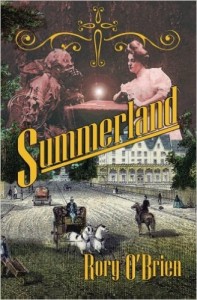 Rory O’Brien has written an enjoyable piece of historical fiction set in the high brow of Newport in 1892. The World’s Fair in Chicago was in full swing (I off-topically recommend Devil in the White City by Erik Larson, which is about that World’s Fair and a serial killer living in Chicago at the time), Lizzie Borden had just been found innocent of killing her parents and society’s elite were heading to Newport to spend their summer relaxing, hosting lavish balls and catching up with friends at one of the town’s social clubs.
Rory O’Brien has written an enjoyable piece of historical fiction set in the high brow of Newport in 1892. The World’s Fair in Chicago was in full swing (I off-topically recommend Devil in the White City by Erik Larson, which is about that World’s Fair and a serial killer living in Chicago at the time), Lizzie Borden had just been found innocent of killing her parents and society’s elite were heading to Newport to spend their summer relaxing, hosting lavish balls and catching up with friends at one of the town’s social clubs.
While these Newport summers seem to be full of the same basic routines, there is usually a seasonal sensation; something that everyone is talking about and wants to take part of. Madame Priestly, a European spirit-medium, is at the tip of the community’s tongue with her uncanny ability to communicate with the dead. She started the summer off with a reading for select Newporters, which turned out to be a rousing success that kept her occupied for most of the rest of the summer.
It was a curious letter to Colonel James Hornbeck, a wealthy and decorated war veteran who lost his beloved wife just a week before, that brought Madame Priestly and her brother, Reverend John Barrows, to move into his Blithewood House mansion for the remainder of the summer. Barrows wrote that Hornbeck’s wife had yet to cross over to the other side and instead has been visiting Madame Priestly in her dreams. This led to multiple meetings and an invitation to become a summer houseguest after their room at The Ocean House hotel was broken into. Hornbeck let Madame Priestly hold private readings and public seances in his home.
Professor Erasmus von Hellman was a master magician and illusionist who lived a life of fame and success. He also worked to expose fake mediums, a highlight of his performance. After hearing of Madame Priestly’s arrival in Newport, he requested his niece and her husband to join him in hopes of exposing her as the fraud he felt she was. He planned to come out of retirement and revive his famous performances for one more summer.
Martin Morrison was an Englishman hired to do a job in Newport. With no distinguishable features, he was able to go relatively unnoticed throughout the town, trying to accomplish his mission. It was a slight misstep that led to him working as a servant at the Blithewood House for a good chunk of the summer.
These characters all connect in one way or another, even though some never actually meet (which is a dynamic I really enjoyed). Their individual stories worked well on their own, leading to a clashing crescendo during a séance that is probably one of the best and most fun chapters of literature I have read all year. This brings about a closely contested trial that has people split down the middle arguing about the validity of mediums.
Newport makes for such a beautiful setting throughout the story. O’Brien paints all the nuances of the town, showing how important it was to upper class citizens at the time. The descriptions of Newport and the locations within it are vivid. It almost becomes another character.
If Summerland wasn’t enough of a treat, O’Brien adds some post story bonus content, giving a brief history of talking to the dead. A lot of history is packed into seven short pages, and I was thrilled to read every word. The origins of talking to the dead are incredibly interesting and the icing on this literary cake.
This was a story that I could not put down. I was hooked immediately and read the last words with satisfaction and sadness, knowing that I was now leaving this world of fiction. O’Brien tied everything together so well, full of interesting dialog and a wonderful storyline. I can’t recommend Summerland enough.
More Posts by The Author:
A Beautiful Ruckus: Studio Playground
Why Leave?: Stay local and tour RI
Scrumptious Chow at Scurvy Dog: Rebel’s Rations takes pride in serving good food for great people
Elizabeth’s Portofino Tuscan Grill: Fine cuisine, philanthropy, and a shot of limoncello
Welcome to the Bandwagon: You’ve heard of Pickleball. Now get to know the sport.

